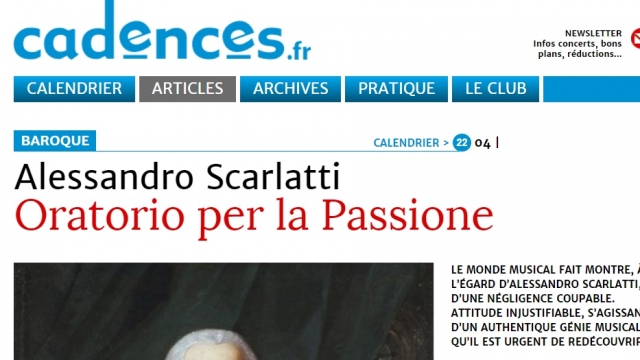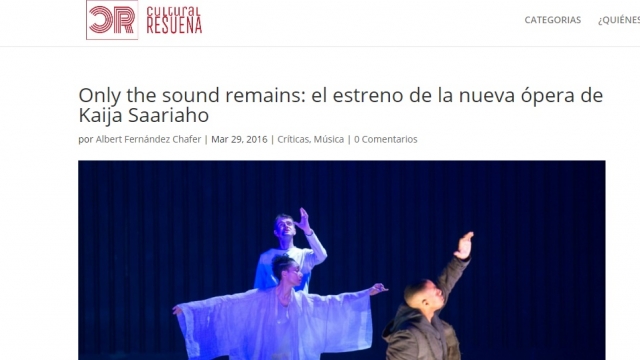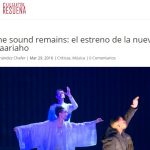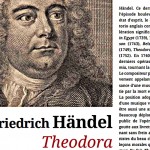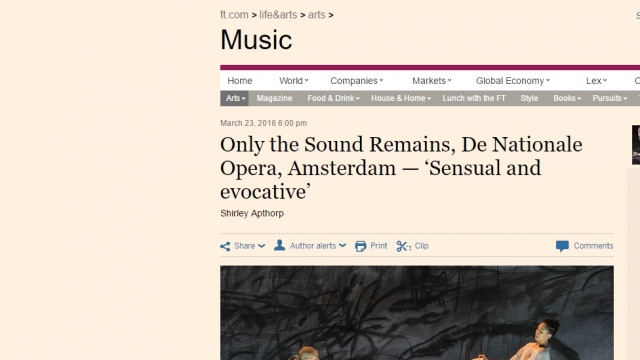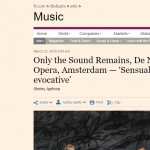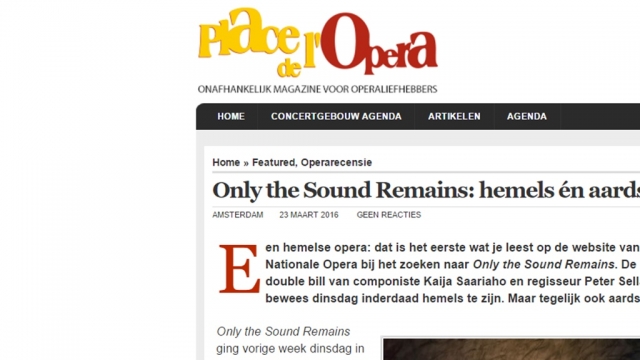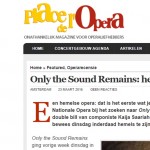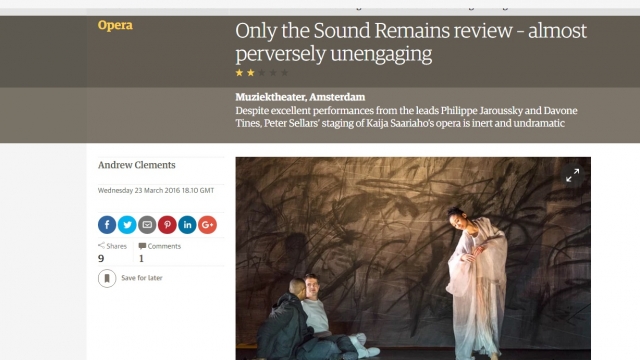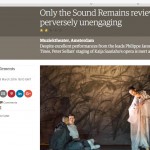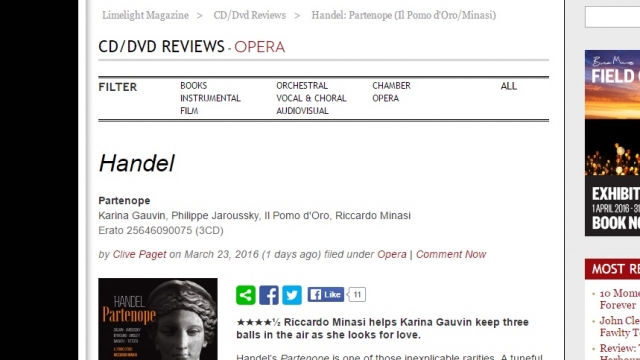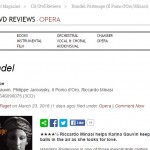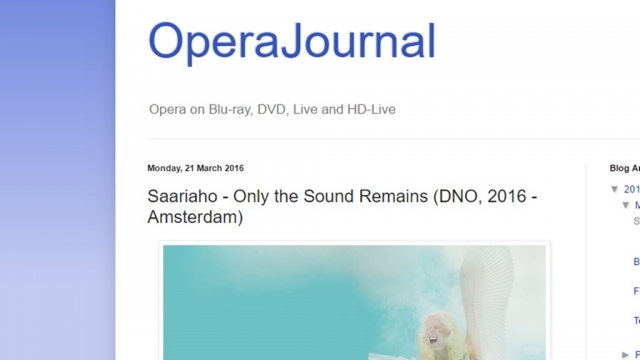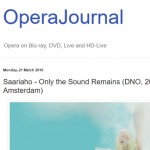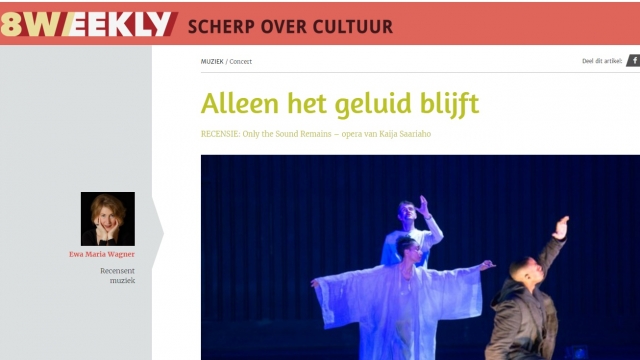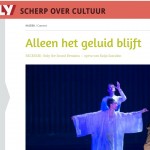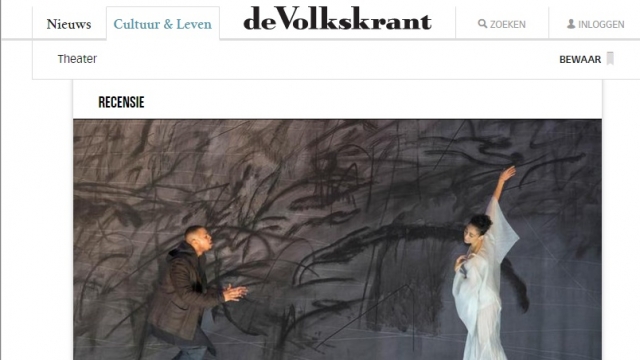2016-03-18, Volkskrant, by Biëlla Luttmer
Disclaimer
This is a fan translation – no infringement of copyright is intended. If you are the copyright holder and have any objections to this being online, drop us a line and we will remove it immediately.
We believe the publication fulfills the conditions of “fair use,” for discussion and study.
Source/Read original: [x]
[caption:] Fisherman Davone Tines and dancer Nora Kimball-Mentzos in Only the Sound Remains.
Only The Sound Remains makes great demands concerning concentration
Conductor André de Ridder admirably ensures that the orchestra sound, and the singers’ voices take off from the stage. Yet it is immobility that is dominating, sometimes making great demands on the concentration of the Western opera fan.
By Biella Luttmer, March 18, 2016
A fisherman finds a feather mantle, which seems to belong to an angel. “I’ll give you back your cloak, but only if you dance for me,” the fisherman says. The angel agrees, but wants the mantle back first. “How can I trust you?” The fisherman replies. The angel says, “Doubt is for mortals. We have no deceit.”
In Only the Sound Remains, the brand-new opera diptych by composer Kaija Saariaho, big themes such as mortality and desire are sliding past in an unassuming way. Sssss-sounds from a small choir, soft glissandi of a string quartet, and bowed [or brushed? Orig: aangestreken toetsen] bars of a vibraphone can heard. They have been mixed with the earthly jingling of a kantele, an old stringed instrument from Saariaho’s native Finland.
Untheatrical Topic
The pieces are based on two texts from the secular Japanese Nôh-theater. Both deal with the living and the dead, and a mysterious contact between the two worlds. Or, perceived from a more personal view: the ones you lost, who are elusive but which you always carry with you.
It is an introvert, untheatrical topic suitable for a book by Murakami; however, it was lost in the immense opera house at the Waterloo. Saariaho, famous for her magical richness of sound, is devoid of any drama or rhetoric. She gives her audience a spirit and a monk. Or, in the second work, a fisherman with the voice and appearance of a monk, and an angel surprisingly similar to the ghost before.
Director Peter Sellars adds a painting by the Ethiopian artist Julie Mehretu, with abstract, dark lines on a white canvas.
Contrast
The text and the music by Saariaho connect with the painting. Over the lines of the light fabric fall the massive shadows of a monk, a spirit, an angel. The result is an imagery of unreal beauty. Light and dark, distance and proximity, the earthly and the celestial are entering a bond.
Conductor André de Ridder admirably ensures that the orchestra sound, and the singers’ voices take off from the stage. Carefully distorted electronically, they encircle the audience like a wreath.
The first part of the diptych is dark, with a bass flute and the drone of a drum. What is beautiful is the contrast between the dark baritone voice of the American Davone Tines and the ethereal voice of countertenor Philippe Jaroussky.
Immobility
The second part is lighter. The bass flute is replaced by a piccolo, and the static male figures are accompanied by a transcendent graceful dancer: Nora Kimball-Mentzos, the alter ego of the angel.
Still, what prevails here is the the immobility. Mehretu’s artwork is greatly enlarged and discoloured to an intense golden yellow, yet it never succeeds in creating the feeling of witnessing a theatrical performance. Rather you feel like looking at the sublime installation of a visual artist. At the end of the evening, there is suddenly a second fabric, a clone of Mehretu’s work. Both cloths are lowered and raised again – the weakest part of the evening.
With her latest opera, Saariaho puts high demands on the concentration of the Western opera lover, who will, in addition to profoundly magical sounds, also at times be taken into a compelling theatrical development – if only briefly.
Ten days to enjoy the opera anniversary
The Opera Forward Festival gives space to new music and different performance practices.
The Dutch National Opera celebrates its fiftiest anniversary. They are not only putting themselves into the spotlight, but rather involve others to join the festivities. Only The Sound Remains kicks off the new Opera Forward Festival, where opera connoisseurs and musicians, directors and artists alike examine the future of the genre.
For ten days, they gather at three locations in Amsterdam: the Nationale Opera & Ballet, the Muziekgebouw and the IJ en de Stadsschouwburg.
There are performances that are innovative, as the one described above, Only The Sound Remains and Blank Out, an opera for soprano and 3D-movie by the Dutchman Michel van Aa. However, there is also the “old” opera “Il matrimonio segreto” by Cimarosa that can be approached in a new way, shown in a production by the Opera Zuid and the Nederlandse Reisopera.
Finally, the opera of the future is already taking shape in five mini-operas, created by students.



